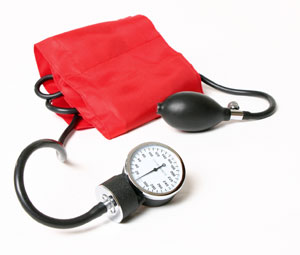
The Kidneys and Blood Pressure
Most people don't know that healthy kidneys control blood pressure in two ways:
- Kidneys balance fluid in the body by controlling how much water and salt is reabsorbed into the body and how much is let out in urine.
- Kidneys make hormones that control blood pressure. When the kidneys fail, they may make the wrong amount of these hormones. If this problem with blood pressure and fluid control happens, your body will be less able to respond to changing fluid levels—and your blood pressure may rise. People with kidney disease are many times more likely to have a heart attack or stroke than healthy people because of this.
You have no doubt had your blood pressure taken when you visit the doctor. Usually, the nurse wraps a cuff around your upper arm. Air is forced into the cuff, making it tight around your arm. Each time your blood pressure is checked, two readings are taken:
- The first reading is taken as your heart is pumping blood. This is systolic blood pressure.
- The second reading is taken while your heart is resting between beats. This is diastolic blood pressure.
Systolic pressure is always higher than diastolic. This makes sense, because the pressure is always greater when your heart is pumping than when it is resting.
Has Your Family Been Tested?
If you have CKD, your parents, brothers, sisters, or children may have it too—and not know it. Anyone who has a family history of CKD should have their blood pressure and kidney function checked each year. CKD that is caught early may be able to be slowed—or even stopped in its tracks!
A typical blood pressure reading might be 130/80 mmHg. The top number, 130, is systolic pressure. The bottom number, 80, is diastolic pressure. Blood pressure is stated as one number "over" the other, or "130 over 80".
With chronic kidney disease (CKD), your blood pressure is "normal" if it stays below 130/80. Recent studies suggest that people with kidney disease should keep their blood pressure even lower: 120/80 or less.
Do you know what your most recent blood pressure reading was?
